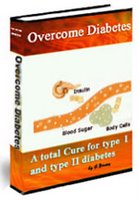Insulin: Insulin Resistance Can Be Reversed
Insulin resistance can be reversed and insulin sensitivity can be restored by diet changes and natural dietary supplements, with the beneficial effects appearing within a few weeks.
Here is some detail about reversing insulin resistance:
------------
Insulin ResistanceBy Grata Young
We hear a lot about insulin resistance, but stop and think a little bit, do you think our cells only become resistant to insulin? The more hormones your cells are exposed to, the more resistant they will become to almost any hormone. Certain cells more than others, so there is a discrepancy. The problem with hormone resistance is that there is a dichotomy of resistance, that all the cells don't become resistant at the same time.
And different hormones affect different cells, and the rate of hormone is different among different cells and this causes lots of problems with the feedback mechanisms. We know that one of the major areas of the body that becomes resistant to many feedback loops is the hypothalamus. The various interrelationships there I really don't have time to go in to here.
But hypothalamic resistance to feedback signals plays a very important role in aging and insulin resistance because the hypothalamus has receptors for insulin too. I mentioned that insulin stimulates sympathetic nervous system, it does so through the hypothalamus, which is the center of it all.
"Insulin is by far your biggest poison." You may find an excellent source of insulin information at: overcome-diabetes.com
The receptors self-regulate.
If you want to know if insulin sensitivity can be restored to its original state, well, perhaps not to its original state, but you can restore it to the state of about a ten year old.
One of my first experiences with this, I had a patient who literally had sugars over 300. He was taking 200+ units of insulin, he was a bad cardiovascular patient, and it only made sense to me that you don't want to feed these people carbohydrates, so I put him on a low carbohydrate diet.
He was an exceptional case, after a month to six weeks he was totally off of insulin. He had been on 200 some units of insulin for twenty-five years. He was so insulin resistant, one thing good about it is that when you lower that insulin, that insulin is having such little effect on him that you can massively lower the insulin and its not going to have much of an effect on his blood sugar either. 200 units of insulin is not going to lower your sugar any more that 300 mg/deciliter.
You know that the insulin is not doing much. So we could rapidly take him off the insulin and he was actually cured of his diabetes in a matter of weeks. So he became sensitive enough, he was still producing a lot of insulin on his own, then we were able to measure his own insulin and it was still elevated, and then it took a long time, maybe six months or longer to bring that insulin down.
It will probably never get to the point of the sensitivity of a ten year old, but yes, your number of insulin receptors increases, and the activity of the receptors, the chemical reactions that occur beyond the receptor occur more efficiently.
You can increase sensitivity by diet, that is one of the major reasons you want to take Omega 3 oils. We think of circulation as that which flows through arteries and veins, and that is not a minor part of our circulation, but it might not even be the major part. The major part of circulation is what goes in and out of the cell.
The cell membrane is a fluid mosaic. The major part of our circulation is determined by what goes in and out. It doesn't make any difference what gets to that cell if it can't get into the cell. We know that one of the major ways that you can affect cellular circulation is by modulating the kinds of fatty acids that you eat. So you can increase receptor sensitivity by increasing the fluidity of the cell membrane, which means increasing the omega 3 content, because most people are very deficient.
They say that you are what you eat and that mostly pertains to fat because the fatty acids that you eat are the ones that will generally get incorporated into the cell membrane. The cell membranes are going to be a reflection of your dietary fat and that will determine the fluidity of your cell membrane. You can actually make them over fluid.
If you eat too much and you incorporate too many omega 3 oils then they will become highly oxidizable (so you have to eat Vitamin E as well and monounsaturates as well) There was an interesting article pertaining to this where they had a breed of rat that was genetically susceptible to cancer.
What they did was they fed them a high omega 3 diet, plus iron, without any extra Vitamin E and they were able to almost shrink down the tumors to nothing, because tumors are rapidly dividing. This is like a form of chemotherapy, and the membranes that were being formed in these tumor cells were very high in omega three oils, the iron acted as a catalyst for that oxidation, and the cells were exploding from getting oxidized so rapidly. So omega 3 oils can be a double edged sword.
To learn more about insulin, please read:
Overcome Type I Diabetes and Type II Diabetes NaturallyAlternative Treatments for Incurable Diseases made easyCost-free Miracle Asthma Cure
Article Source:
http://EzineArticles.com/?expert=Grata_Young------------
Technorati tags:
diabetes,
diabetes treatment,
insulin resistance,
insulin.
insulin resistance







